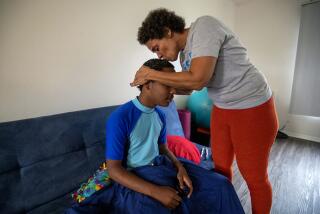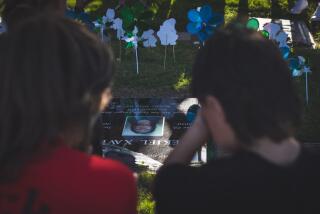Evil Lurks Close at Hand for a Young Boy: Am I Going to Die?
- Share via
To 7-year-old boys it looked innocent enough.
Also intriguing.
A narrow, pink plastic box, only a few inches long, lay near some boulders in Chatsworth Park. So the four boys, Christopher and Ryan Fennell and two friends, lifted the lid and removed the mysterious contents, a spoon and a used hypodermic syringe.
All the boys examined the syringe. But only Christopher, while trying to replace the orange cap on the needle, pricked himself on the finger.
Not all tragedies begin with gunfire and earthquakes. Sometimes they begin with something seemingly benign--a slip, a fall, even a pinprick. Christopher’s father, Rick Fennell, knows this and he is a worried man these days.
Just last month, Joann Marie Ruiz, a nurse in Sacramento, died of AIDS she contracted after drawing blood from an HIV-infected patient in July, 1987. The needle slipped and plunged into her thigh, sending the tainted blood into her system. She was 42 when she died.
The chances that Christopher’s needle-prick will end in tragedy are extremely slim, doctors said. The needle did not draw blood. What’s more, the syringe’s contents had dried out, and although the AIDS virus destroys the body’s immune system, the virus itself is fragile and dies quickly outside the body, doctors said.
Fennell fears for his son’s health but also worries about less obvious side effects. Christopher and Ryan are twins and turn 8 next month.
Why, he asked, must boys that age have to worry about grim topics like AIDS and how to protect themselves against it? Why must they learn now what junkies are, and that they sometimes toss aside their spent needles?
“That’s what frustrates me to death,” Fennell said, “that a 7-year-old should have to know what that is.”
Fennell and his wife, Faith, moved to California from Tulsa three years ago, settling into a tan stucco house with brown trim in Santa Clarita. He is an insurance agent and a deacon at Shepherd of the Hills Church in Chatsworth.
Fennell confessed that since Christopher found the syringe in the park, he has wondered whether leaving Oklahoma was wise. And it’s not just the syringe which touches his thoughts. Just a few months ago, while serving as a substitute P.E. teacher at San Fernando High School, students warned him to take off his Pittsburgh Pirates baseball cap.
The golden P represented a Pacoima gang’s colors. “You don’t wear that cap here,” students told him. “You’ll get shot with that.”
He took the cap off.
Of course, even Oklahoma is not immune. “They have drugs back there too,” he said in his gentle twang. But life is different. “You’re more protected.”
Fennell also said that what happened to Christopher on a recent Sunday afternoon could have happened anywhere.
The day had started off well. The family attended Sunday services and then headed off to Chatsworth Park with the rest of the congregation for a church picnic. Fennell played softball while Faith watched from the sidelines. Christopher, Ryan and their buddies rode their bikes. “We were having a great time,” Fennell said.
The boys, out of curiosity, brought the hypodermic they found to Faith Fennell shortly before the ballgame ended. She quickly ordered the boys to wash their hands. After Fennell trotted off the field, his wife handed him the pink box.
“Look what your sons found,” she said.
Fennell opened the box. In an instant he recognized the purpose of the syringe and especially the bent spoon, blackened on the bottom from being held over a flame. “Boys, this is extremely dangerous,” he said.
Like most youngsters who fear they’ve done something wrong, the boys answered evasively as the parents and other adults interrogated them on how they had handled the syringe. Christopher finally admitted that he had poked himself.
Then someone mentioned AIDS.
Even 7-year-olds from Tulsa know what that is.
“Am I going to die?” Christopher asked. He was crying now.
“I don’t want my brother to die,” Ryan said.
Fennell assured the boys that Christopher wouldn’t die and squeezed the boy’s right index finger to see if blood would escape the pinhole.
None did.
That night at home, while saying their regular evening prayers, the family prayed for Christopher.
The next day, Christopher was taken to the family physician, who inoculated the boy against hepatitis and took a blood sample to use for comparison when he is tested for the HIV virus in six weeks and again six months from now.
Dr. Martin Finn, who heads the AIDS prevention program for the Los Angeles County Department of Health, said the doctor’s actions were wise precautions. Finn said the chances of infection are remote and said the county rarely received reports of people stumbling across the needles of drug users.
On the way home from the doctor’s office, Fennell took Christopher to an ice cream shop, treating him to a cup of vanilla piled with gummy bears on top.
The father’s thoughts were still on the upcoming AIDS test even as Christopher’s attention switched to the ice cream.
He couldn’t shift mental gears as quickly as his son. “Children are so resilient. They go on with it. Adults have to carry the burden,” he said.
Fennell confessed to frustration--anger is the wrong word, he said--over what his boys did. “Just Say No” is a common theme at the Fennell house, a homey place with lots of family photos on the walls and a doormat announcing, “Friends Are Always Welcome.”
“We drill it into the kids that these things are dangerous,” he said. “Don’t touch.” The boys touched the syringe anyway. “Just natural curiosity,” Fennell said.
Now Fennell and his wife and the boys will wait the rest of the year for the crucial lab report. That’s just natural curiosity, too.
Very serious curiosity.
More to Read
Sign up for Essential California
The most important California stories and recommendations in your inbox every morning.
You may occasionally receive promotional content from the Los Angeles Times.













